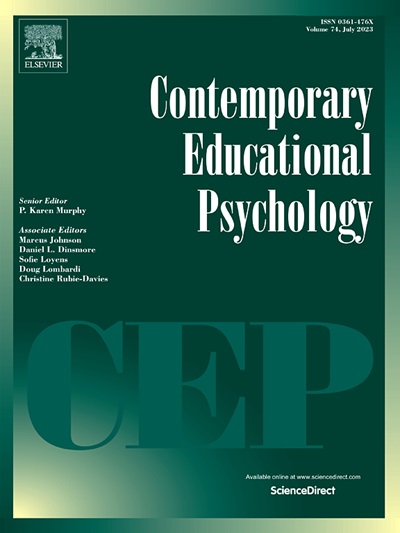Race-based trauma: Teacher responses, supports, barriers, and burnout
IF 3.8
1区 心理学
Q1 PSYCHOLOGY, EDUCATIONAL
引用次数: 0
Abstract
The trauma of racism is a common experience among people of color in the United States. Minority children are more likely to experience race-based trauma (RBT) within their communities. Teachers are well positioned to recognize such distress. While mechanisms remain poorly understood, empathy may play a key role in how teachers support students who have experienced RBT. Though the benefits of empathy are well-known, it may be that bearing witness to another experiencing RBT could produce personal distress resulting in dissociation from the student to alleviate such distress. Such reactions may be more likely when a teacher is experiencing burnout. The purpose of the proposed research is to examine the relationships between teacher factors such as burnout as well as teachers’ responses to student RBT. We also seek to identify behavioral strategies associated with these responses and the situational factors that influence them. In-service teachers (n = 178) completed a measure of teacher burnout, viewed a video of a student describing a race-based traumatic event, completed a measure of their emotional response to the video as well as open-ended items exploring hypothetical and actual experiences with such students. We found that teachers with higher levels of burnout were also more likely to report self-focused, unpleasant emotions in response to the video. Qualitative analysis revealed six categories of responses: (a) Help, (b) reassurance, (c) listening, (d) personal reaction, (e) reframing, and (f) relating. We also identified six categories of supports that permitted desired responses to student RBT: (a) Personal experiences, (b) personal attributes, (c) external support, (d) time, (e) listening, and (f) relationship with students as well as six barriers that prevented desired responses: (a) Unequipped/unprepared, (b) external factors, (c) unfamiliar with students, (d) unfamiliar with context, (e) lack of information, and (f) lack of time. Theoretical and practical implications are discussed.
种族创伤:教师的反应、支持、障碍和职业倦怠
种族主义造成的创伤是美国有色人种的共同经历。少数族裔儿童更有可能在其社区内经历基于种族的创伤(RBT)。教师完全有能力识别这种困扰。虽然人们对其机制仍然知之甚少,但同理心可能在教师如何帮助经历过种族创伤的学生方面发挥着关键作用。虽然共情的好处众所周知,但目睹他人经历 RBT 可能会产生个人痛苦,从而导致与学生分离,以减轻这种痛苦。当教师出现职业倦怠时,可能更容易出现这种反应。拟议研究的目的是考察教师职业倦怠等因素与教师对学生 RBT 的反应之间的关系。我们还试图找出与这些反应相关的行为策略以及影响这些反应的情境因素。在职教师(n = 178)完成了教师职业倦怠的测量,观看了学生描述种族创伤事件的视频,完成了他们对视频的情绪反应测量,以及探索与此类学生相处的假设和实际经验的开放式项目。我们发现,职业倦怠程度较高的教师也更有可能在观看视频时产生以自我为中心的不愉快情绪。定性分析揭示了六类反应:(a) 帮助,(b) 安慰,(c) 倾听,(d) 个人反应,(e) 重塑,(f) 关联。我们还发现了允许对学生 RBT 做出理想反应的六类支持:(a) 个人经历,(b) 个人特质,(c) 外部支持,(d) 时间,(e) 倾听,(f) 与学生的关系,以及阻碍做出理想反应的六种障碍:(a) 未装备/未准备,(b) 外部因素,(c) 不熟悉学生,(d) 不熟悉环境,(e) 缺乏信息,(f) 缺乏时间。讨论了理论和实践意义。
本文章由计算机程序翻译,如有差异,请以英文原文为准。
求助全文
约1分钟内获得全文
求助全文
来源期刊

Contemporary Educational Psychology
PSYCHOLOGY, EDUCATIONAL-
CiteScore
16.50
自引率
3.90%
发文量
74
期刊介绍:
Contemporary Educational Psychology is a scholarly journal that publishes empirical research from various parts of the world. The research aims to substantially advance, extend, or re-envision the ongoing discourse in educational psychology research and practice. To be considered for publication, manuscripts must be well-grounded in a comprehensive theoretical and empirical framework. This framework should raise critical and timely questions that educational psychology currently faces. Additionally, the questions asked should be closely related to the chosen methodological approach, and the authors should provide actionable implications for education research and practice. The journal seeks to publish manuscripts that offer cutting-edge theoretical and methodological perspectives on critical and timely education questions.
The journal is abstracted and indexed in various databases, including Contents Pages in Education, Australian Educational Index, Current Contents, EBSCOhost, Education Index, ERA, PsycINFO, Sociology of Education Abstracts, PubMed/Medline, BIOSIS Previews, and others.
 求助内容:
求助内容: 应助结果提醒方式:
应助结果提醒方式:


